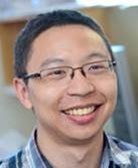Back
NBD Seminar Series (Hybrid): Sparse coding for odour-specific memories through homeostatic plasticity
Abstract:
Stimulus-specificity of associative memories is enabled by sparse coding (only a small fraction of neurons responds to each stimulus). We found that optimal sparse coding in the fruit fly’s memory centre, the mushroom body, is maintained by homeostatic plasticity, where neurons compensate for disturbances away from their ‘preferred’ activity level. We observe both physiological and anatomical compensation and show using computational models that this compensation enhances memory capacity.
Venue:Room 7C, Level 7, Duke-NUS
Join Zoom Meeting:
https://nus-sg.zoom.us/j/84314248216?pwd=aFE4eU1kbTh1VnFJZUpFOWQ4aGlXQT09
Meeting ID: 843 1424 8216
Passcode: 219896
Host:Assoc Prof Adam Claridge-Chang
Principal Investigator
Neuroscience & Behavioural Disorders Programme, Duke-NUS
Contact Person:
Jacqueline Ho (jacqueline.ho@duke-nus.edu.sg)
Neuroscience & Behavioural Disorders Programme, Duke-NUS
Date and Time
30 Jan 2023 @ 12:00 - 30 Jan 2023 @ 13:00
Speaker

Dr Andrew Lin
Senior Lecturer
School of Biosciences
University of Sheffield, UK
Andrew Lin received his bachelor’s degree in biology from Harvard University. He did his PhD on local translation in axon guidance with Christine Holt at the University of Cambridge. He did his postdoctoral work on sensory coding and memory with Gero Miesenböck at the University of Oxford. Since 2015, he has been a group leader at the University of Sheffield, where he is currently a Senior Lecturer